Come Sunday, K. Ramanna, a farmer from Kanarpa village, near Mundaje in Dakshina Kannada district, gets up at 4.15 a.m. and drives his four-wheeler to Mangaluru which is about 80 k.m. away. The vehicle is full of vegetables cultivated organically by him and some other farmers known to him in the village. He sells them at the weekly “santhe” (shandy) on Panje Mangesh Rao Road in the central business district of Mangaluru between 6 a.m. and 10.30 a.m. This is his routine for a decade.
Savayava Krushika Grahaka Balaga (which is a group of consumers promoting organic farm products) of Mangaluru has been organising this Sunday santhe since 2013. It is the shandy, now in its 11th year, launched by consumers who want to keep away from vegetables, fruits and other food products grown or made using chemicals and to create a market for organic farmers to promote them.
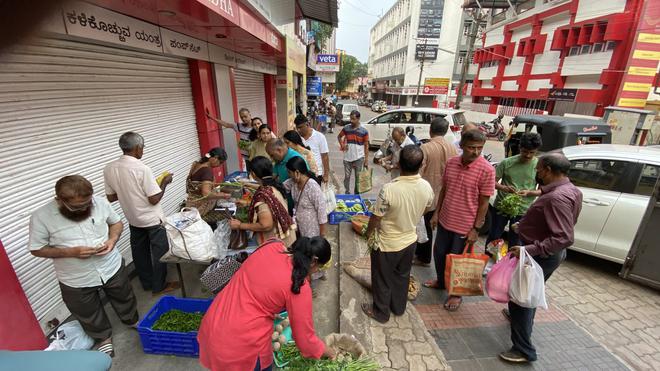
How it began
K. Ratnakar Kulai, one of the people behind the launch of this market and who is also the Secretary of the Balaga, a registered body, told The Hindu, “People like me and Addor Krishna Rao began this in 2012 as ‘swavalambi santhe’ to promote home-made products without making any distinction as organic or chemical-based products. We organised 12 “swavalambi santhes”, one per month at different locations, including in some houses, in Mangaluru during 2012. Then we observed that consumers’ interest was more towards purchasing organic products. Consumers asked for organic vegetables and other products. The Balaga was formed next year and chose Panje Mangesh Rao Road to hold the shandy on the roadside to promote the sale of only organic vegetables and other organic products.”
The organic market did not stop during the pandemic and they continued it by obtaining permission from the Deputy Commissioner, recalled Kulai.
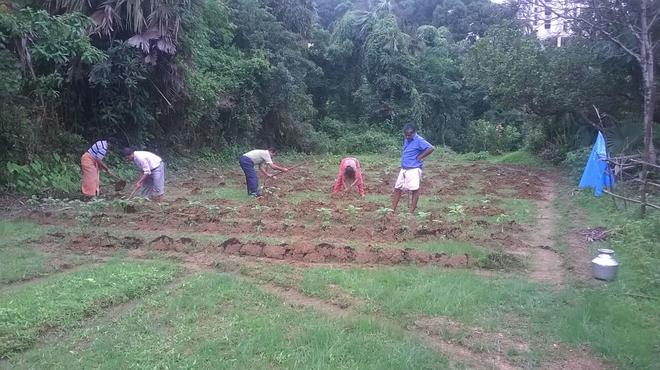
Review team
Not all farmers are allowed to sell their produces under the tag of “organic” in the shandy. The Balaga has formed a four-member team to check whether the farmer can be allowed to sell the produce and is indeed an organic grower. The team visits the house/farm of such seller to ascertain the authenticity. “After the screening, 18 farmers now have been allowed to sell their produces on Sundays,” Mr. Kulai said adding that all of them don’t turn up every Sunday and they sell whenever they have produce.
“We did send back six sellers from the market after finding that they are not genuine. One of them was found purchasing chilly from the open market and trying to sell in our shandy. Those six persons have not been allowed to return,” Mr. Kulai said.
A. A. Fazal, a retired Professor of Food Technology, College of Agriculture, Hassan, is a permanent consumer of the produces sold at the santhe. Earlier, he also served as the Secretary of the Balaga for three years. “There is no doubt about the authenticity of the produces sold at the market. We as a team did visit the farms and houses of growers and interacted with them before allowing in the market. We are aware of what is happening in the name of organic in some other places,” he said.
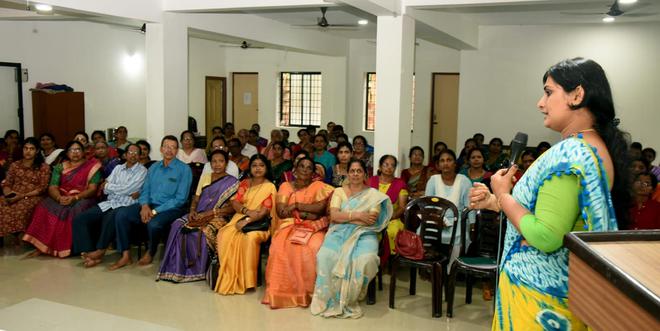
Uniform price
The Balaga fixed the price for each of the produces meant for sale in the shandy. All the growers will have to sell the produces for uniform rate.
Pradeep Soori, a retired bank employee and an urban farmer who used his 24 cents of land for growing vegetables and fruits in Mangaluru for long, is among the two-member team which fixes the prices for every week. The other member is Narasimha Mayya, a grower from Bantwal who has been selling his produces/products in the market since the beginning in 2013.
Soori told The Hindu that the team studied the prevailing market rate and fixed the price by ensuring that it did not affect both the seller and buyer.
“Farmers get an assured price in the market. For example if the price of banana falls steeply in the open market the grower selling the same in Balaga’s market will continue to get the assured price. Then the farmer need not sell it at throw away price in the open market. Likewise if the price of a produce goes up steeply in the open market, consumers at Balaga’s market will get it at the assured price without it being too high,” Soori said.
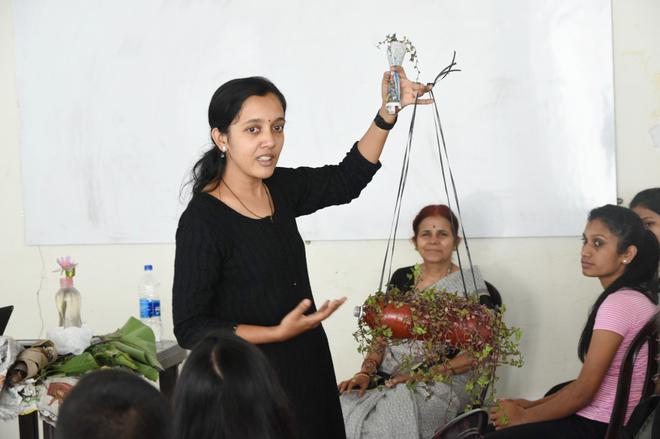
No bargain
Premananda Shetty, a former Mayor of Mangaluru and now whip in the Mangaluru City Corporation Council, is a long time consumer of the produce sold at the market. He said that consumers do not bargain while purchasing produce and pay the rates fixed. “We do get some traditional tubers, green leafy vegetables and other vegetables in this market,” he said adding that the taste of food made from organic produces differed from that of produces grown using chemicals.
The consumer base of the market comprises teachers, advocates, doctors, engineers, retired bureaucrats and others in general.
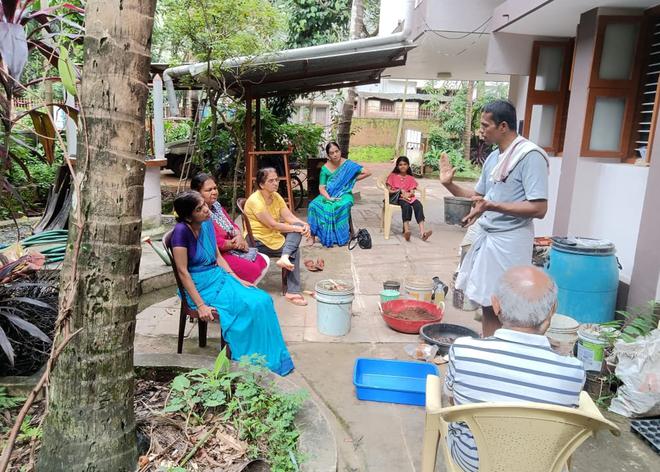
Lacking venue with shelter
Though a decade has passed the Balaga has not got a proper venue with roof for hosting the santhe and continues to depend on the available space in front of shops on the P.M. Rao Road as shops remain closed on Sundays. “To have a proper venue is our major requirement now,” said Sharat Kumar, an ex-serviceman who is the treasurer of the Balaga.
The activity of the Balaga is not limited to only organising the santhe and acting as an interface between growers and consumers. “We distributed vegetable seeds freely to over 1,000 houses in Mangaluru to encourage them to grow their own vegetables,” said Kulai.
The Balaga has so far organised 10 demonstration-cum-training programmes for the consumers on how to grow vegetables in their own premises and in the kitchen garden, balconies of apartments or on the terraces. “More than 500 persons have attended these programmes,” said Kulai.
In addition, it has organised field visits of consumers to the farm land of identified farmers. “We have made consumers work on the field by making them plant paddy saplings (at Karambar village near Mangaluru) and involving them in vegetable cultivation (in Mogaru village near Mangaluru) to experience farming,” he said.
The Balaga has organised six jackfruit festivals in Mangaluru to promote jackfruit and its value added products. In addition, it has organised a millet mela. “We have distributed 30 beehive boxes of “mujenti jenu” (stingless honey bees) to those interested in apiculture,” he said.
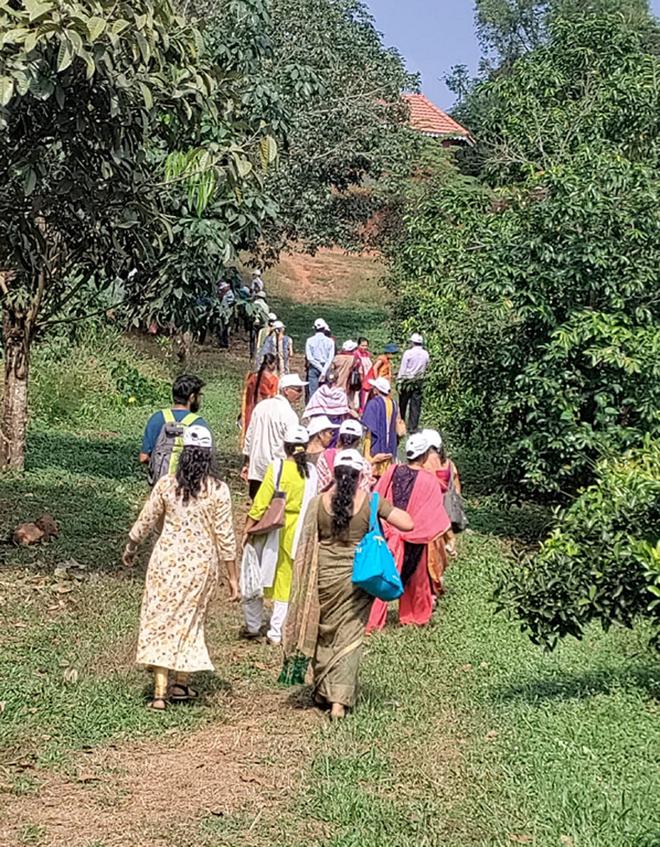
Books published
It has published mini hand books – on grafting, kitchen gardening, health maintenance -- and distributed them among consumers. “We will publish two more mini handbooks on decorative plants and on plant disease management,” he said. The Balaga has organised lectures on food habit and three demonstration-cum-trainings on preparing plant based medicines at home for treating common recurring ailments.
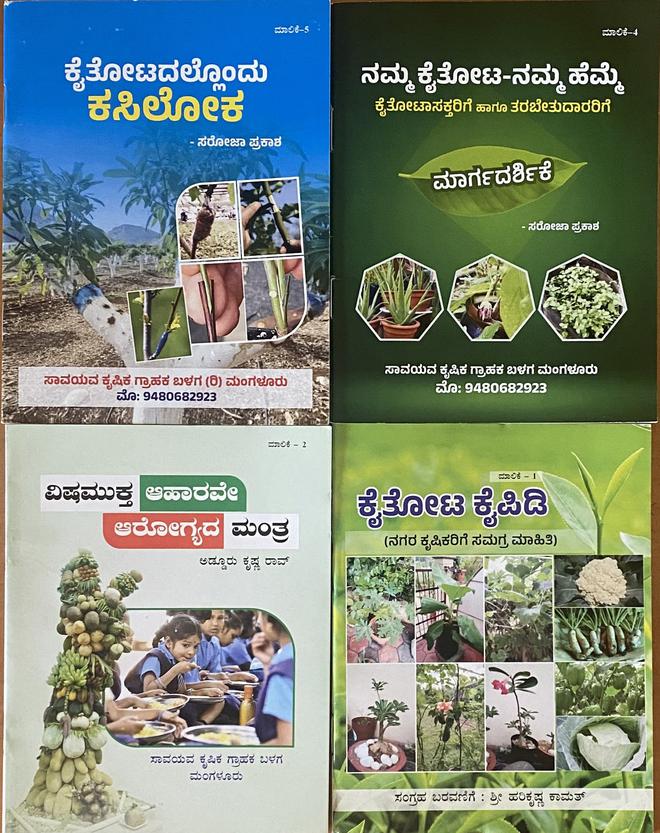
“We do act as an interface between urban farmers and pot mix manure makers to ensure that urban farmers got organic manure,” Mr. Kulai said. The Balaga is now headed by G. R. Prasad who is also the president of Pranava Souharda Sahakari Sangha Ltd., Mangaluru.







